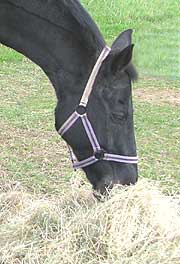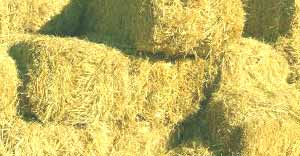Feeding Hay to Horses and Ponies
 High
quality hay can be an excellent source of
nutrition for - including protein and calcium - for horses and ponies
and is a very palatable feed.
High
quality hay can be an excellent source of
nutrition for - including protein and calcium - for horses and ponies
and is a very palatable feed.
There are many types of hay harvested from grasses including alfalfa,
timothy, clover and rye.
Many horse owners advise that Alfalfa hay is the best kind of hay to
feed a horse.
Horses and ponies in their natural environment are grazing animals -
they spend many hours a day eating grass.
When horses are stabled, or grazing is limited, they need a substitute
for the grass they would have naturally eaten. Hay , the most common subsitute-
is a mixture of grasses dried until only about 18% of the moisture remains.
WHAT ARE THE MOST NUTRITIOUS TYPES OF HAY TO FEED A HORSE?
The most nutritious hay is that cut before the seed heads have fully
matured.
Grass and hay provide your horse or pony with the large amounts of fibre
he needs keep his gut healthy and digestive system functioning properly.
They should be the predominant type of feed in a horse's diet.
If your horse or pony is stabled making hay available all the times
can help to prevent vices such as weaving and crib biting
as it prevents boredom and encourages his natural foraging habits.
Most horses will self-regulate the amount of hay that they eat. But
some will need their hay restricted to prevent them becoming overweight.
Many people will soak
their horse's hay before feeding to remove dust and spores which can
cause coughing.
Unfortunately soaking hay can reduce the nutritional value of hay, as
up to 70% of water-soluble carbohydrates and 20% of protein is lost during
this process. A better alternative is to
steam hay
If your horse develops a
cough when fed dry hay it may be worth considering switching to HorseHage,
Haylage or a similar equine product.
Benefits of feeding
hay
- Hay provides the fibre needed to keep the horse's digestive
system functioning properly.
- Provides vitamins and nutrients
- Keeps weight on your horse or pony.
|
Daily amount
of hay to feed a horse
A horse should eat approximately12-15 pounds of hay a day
- about 2 pounds of hay per day for every 100 pounds of a
horse's body weight.
This amount is a rough average - a horse or pony needs will
vary depending on their workload, metabolism, time of the
year, the quality and amount of grazing that they have access
to and what "hard food" they are being fed.
Ponies will require a lot less hay , while large draft horse
breeds can eat more than 30 pounds of hay a day, a 12hh pony
in light exercise usually requires only about 9lb a day.
Common sense prevails here. As long as your horse or pony
is not overweight it is OK to feed him as much as he wants
- most horses will not eat more than they need.
Put the hay in a haynet and weigh it on spring balance scales
with a hook hanging down and a dial - very cheap to buy. After
a while you begin to develop a feel for what weighs "right"
regardless of volume.
If your horse never leaves any waste hay he probably isn't
getting quite enough for his liking! |
Soaking hay
Soaking your horse's
hay before feeding can control the dust and mould spores
which cause "hay coughs" and aggaravate COPD.
Some owners also soak hay to actually remove some of the
nutritional value including sugars and starches when feeding
overweight horses and ponies.
If you soak hay to remove dust and spores do so in clean
water for between 30 minutes and 1 hour.
20 - 30 minutes of soaking sticks spores to the hay stalks
so that they cannot be inhaled by the horse
1 -2 hours of soaking swells the spores so that they cannot
be inhaled by the horse.
Any longer than 2 hours of soaking greatly reduces the nutritonal
value of hay.
Soak the hay in a bath or tub or water. Allow to drain before
feeding.
Dispose of the waste soaking water carefully as it is a
pollutant similar to sewage.
If you have a kettle available, a good method is to put a
haynet full of hay in a bin or bath and pour boiling water
over it .
The steam swells up the fungal spores more quickly, and
there is less waste water to dispose off and less nutrition
is lost.
Steamers are available specially manufactured for steaming
hay.
If you are soaking the hay because it is of poor
quality then you'd really be better to not feed that hay to
your horse. |
|
 |
Choosing the best
type of hay for your horse
Good hayshould smell sweet and be free of mould, dust or
poisonous weeds - especially
ragwort.
Hay to be fed to a horse should have fine stems and lots
of leaves
Mouldy hay smells musty and has white, brown or grey patches.
Do not feed it to your horse! It can cause coughs, respiratory disease and colic.
Any hay can become mouldybecause of harvesting or storage
problems.
In some countries, especially North America, Blister Beetles
are to be found in hay.
Hay containing Blister Beetles should not be fed to horses. |
Types of hay
Good quality hay can contain many types of grasses and foliage
including:
- Clover
- Alfalfa
- Rye Grass
- Timothy
- Fescue
- Cocksfoot
|
HOW TO FEED
HAY
- Haynet. be sure the net is tied safely and is high enough
so that your horse can't get a leg caught in it.
- Hayrack
- On the floor / from the ground - the most natural way
for a horse to eat! However this can be a very wasteful
way to feed hay
|
Vitamins in hay
Hay contains high levels of vitamins A, E, K, and D.
However, hay that is a year old will have a low vitamin
content since vitamins in hay break down with time. |
WARNINGS!
- If you use a haynet make sure that the net is tied safely
with a quick release knot and is high enough so that your
horse can't get a leg caught in it.
- Bales are held together by string or wire; be sure to
remove these after cutting open a bale of hay.
- Never feed feed mouldy or dusty hay. This can cause coughs,
respitory illnesses and colic.
- Make sure that the hay doesn't contain any poisonous weeds.
Keep a special lookout for ragwort in Hay.
|
|
Advice about the best way of feeding hay to a horse or pony,
different types of hay

 High
quality hay can be an excellent source of
nutrition for - including protein and calcium - for horses and ponies
and is a very palatable feed.
High
quality hay can be an excellent source of
nutrition for - including protein and calcium - for horses and ponies
and is a very palatable feed.